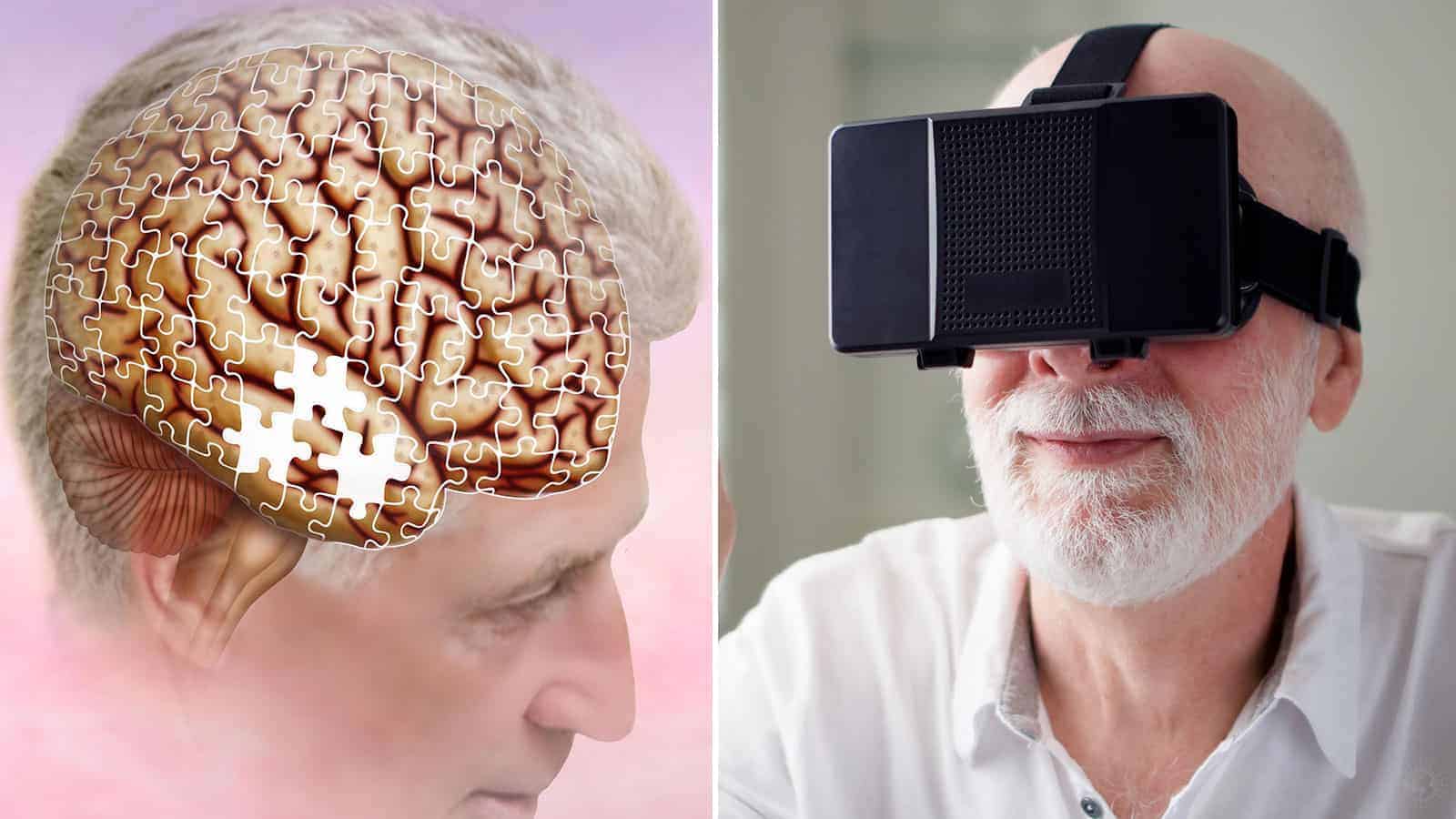According to recent medical studies, science is revealing how virtual reality, or VR, can improve the lives of Alzheimer’s patients. Although the statistics are preliminary and the technology has been around since 1957, the results are promising. Perhaps VR can be the treatment that you or a loved one who battles dementia needs.
Currently, there is no cure for Alzheimer’s Disease or regaining the cognitive functions it erodes from the brain. It’s a devastating neurological disease that slowly robs people of their memories until they no longer recognize loved ones or themselves. The medical community has sadly dubbed it as “The Long Goodbye.”
If you or a loved one has been diagnosed with Alzheimer’s or another form of dementia, you may feel like there’s no hope. Fortunately, some positive strides have been made to at least slow down the process, like virtual reality therapy. Many patients and caregivers have reported positive results.
Besides medication, what are some other therapies to help patients with Alzheimer’s or dementia? Medical experts recommend both medication and treatment for optimal treatment. Here are some therapy options to discuss with your professional healthcare provider.
What is Virtual Reality Therapy?
If your kids or grandkids are into video gaming, they can tell you all about virtual reality. What was once the fantasy of science fiction writers has become a real technology. Visit any theme park in America, and you will probably experience some attractions that use VR. The best bachelor parties in Toronto use VR.
Virtual reality uses sights and sounds to make you feel like you are in the setting. Participants wear special goggles equipped with electronic sensors. The three- dimensional images and surround sound are stunningly realistic.
Alzheimer’s and dementia patients eventually lose cognitive function and much of their memory. The sensory experiences of virtual reality stimulate patients’ brains and may bring out remaining memories. In VR therapy, the patients choose their environments, like being on a beach or out in the woods listening to songbirds.
While this therapy can’t revive memories gone with decayed brain cells, it may prompt patients to re-live pleasant memories still stored. In controlled tests, many patients taking VR therapy can always choose their favorite scenarios on their own.
Patients can visit the seashore or any setting in the world from the comfort of the therapist’s office. They can see the places they once loved and can no longer visit due to their health conditions. VR therapy can take them to scenes in their mind that bring joy and comfort to them.
Eight Other Useful Ways to Stimulate Cognitive Function in Alzheimer’s Patients
1 – Music Therapy
Music has long been associated with brain stimulation and mood enhancement, so it is a viable therapy for Alzheimer patients. Some virtual reality therapists combine music with VR sessions for a total sensory experience.
Perhaps you have visited a nursing home or an assisted living facility and heard therapists playing music and singing with the residents. Often, people who have Alzheimer’s or dementia still have enough long-term memory to remember songs from their past. Hearing the upbeat music takes them to a happy place in their mind.
Does your loved one still play a musical instrument, like the piano or guitar? Keep his/her favorite instrument available each day, along with sheet music, if they play by note. You can have memorable times playing and singing together.
As a caregiver, you may consider playing music for your loved one that they have always enjoyed. Even non-verbal patients seem to perk up when hearing familiar tunes. You may be surprised that some patients in the early stages of the disease may sing along with you.
2 – Basic Organizational Tasks
Was your family member a person who enjoyed organizing or housekeeping? Everyone likes to stay busy and feel needed, even with Alzheimer’s or dementia. When you offer your loved one a small task to do, it can stimulate his/her cognitive functions and feelings of belonging.
When you do laundry, let your loved one match socks or fold towels. Keeping them busy may ease anxiety and boredom. If you are working in the kitchen, let your loved one help with simple recipes, like stirring cookie batter or buttering toast.
Patients who are still ambulatory may enjoy helping you dust furniture or clear the dinner table. If your loved one was an avid gardener, let him/her assist you in planting seeds or pulling weeds. Let him/her re-live the pleasures they had.
3 – Encourage Your Loved One’s Creativity
Even when someone’s mind is affected by the ravages of Alzheimer’s or dementia, they can still appreciate art and beauty. It is part of them and is embedded in the soul. Instead of your loved one just wasting away in a recliner, you can be part of enriching their remaining life.
They don’t need to be Rembrandt to delight in creating a lovely picture with whatever art mediums you choose, even if it’s coloring books. Perhaps your loved one liked to draw, knit, crochet, or do any number of handcrafts. Encourage them to do any creative art they want.
4 – Make Reading Part of Everyday Activities
Reading is a passion for life that stays with one’s heart even when you no longer comprehend the words. Alzheimer’s and dementia patients who are ardent readers usually continue this favorite pastime. Encourage your loved one’s passion for books and keep several within reach.
What do you do when your family member can no longer read or understand? Holding a book or magazine can be familiar and comforting. Sometimes, just looking at the pictures together can be a rewarding activity. Don’t forget the impact of reading aloud. Try to read a chapter or a short story together daily.
5 – Pet Therapy
The medical community has long recognized the benefits loving animals offer to people, including those with Alzheimer’s and dementia. There’s something about cuddling a gentle dog, cat, or another therapy animal that goes beyond words or cognition. Pets give acceptance and unconditional love that resonates in everyone’s spirit.
Do you have a beloved family pet to spend time with you and your loved one? Petting and caring for an animal can brighten both of your spirits and may trigger some fond memories. You may need to help your loved one understand how to hold a smaller animal.
6 – Spend Time with Kids
Parental love stays with us regardless of who or what we can remember. Encourage your children and grandchildren to spend time with their loved ones with Alzheimer’s or dementia. The happiness and laughter of youth are contagious, and you can feel the bond connecting both generations.
7 – Planting and Caring for a Garden
You know that plants purify the air and provide nutritious food for the animals and us. Did you also know that tending to houseplants or a garden can boost your mood? No wonder so many people around the world love plants.
Perhaps your loved one with Alzheimer’s or dementia has a lifelong green thumb. While they can’t care for a large-scale garden, miniature style, and container gardens are ideal. Watch the smiles of joy and satisfaction as you both dig into the fertile earth, plant seeds, and watch them grow.
Colorful flower gardens envelop the senses with color, texture, and delightful fragrance. Maybe you both would enjoy planting a small vegetable patch and harvesting the ripe veggies. Tailor your gardening activities to your loved one’s ambulatory, energy, and cognitive levels.
8 – Browse Through Family Photo Albums
They say a picture paints a thousand words, especially when these images of long ago are painted on our hearts. Surround your loved one with family photos to inspire memories and joy. Try not to be discouraged when they have confused faces and names.
Since many Alzheimer’s and dementia patient’s fragile memories are often frozen in the past, they often recall old family photos, but not recent ones. Browse through the pictures together and cue him/her by identifying people and talking about some of your favorite memories with each.
Do you have vintage family home movies or videos? Watching these can take your loved one to the moment to re-live weddings, reunions, and family vacations. Your loved one may want to talk about it, or silently relish the memories.
Final Thoughts on Virtual Reality and Other Therapies for Alzheimer’s Patients
As you lovingly care for a parent, spouse, or another precious person with Alzheimer’s or dementia, it is important to also care for yourself. Caregiving can be exhausting physically, mentally, and spiritually. Get the rest you need, and don’t hesitate to ask for help when you are overwhelmed and need a break.
While implementing virtual reality or other therapy ideas into your daily caregiving activities, enjoy each special moment. If your loved one doesn’t want to participate one day, set the activity aside for later. Even when your loved one no longer recognizes you, you still know him/her and can still spend quality time together.
Thanks to the fascinating science of VR and other useful therapies, you can bring life and joy to a loved one with Alzheimer’s or dementia. Talk to your doctor about how to incorporate VR therapy into the patient’s care plan. You’ll never regret spending quality moments with your dear family member.

















 Community
Community

